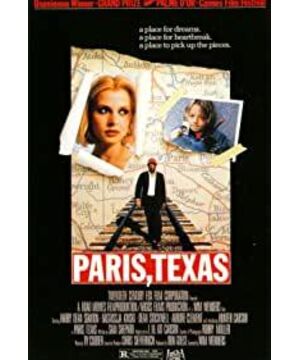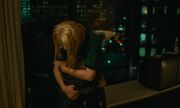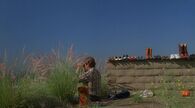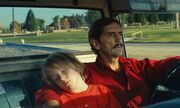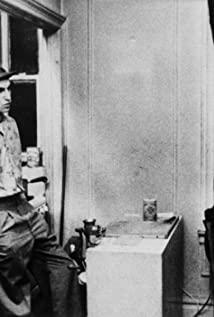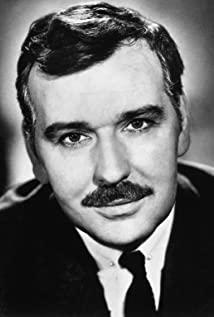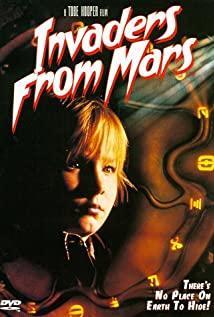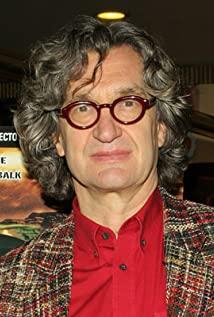''I've been talking to you, even when I'm alone... and now, I don't know what to say. It's so much easier when I just imagine you, I even imagine you talking to me like you're really there, I can hear you, I can see you, smell you...I can hear you Your voice... ...''
Jane's monologue illustrates a situation in which imagination and reality are incompatible . After recounting the series of disasters that have endured their relationship, the film reveals why here. ''I can't see you, Jane''. Tevez's previous response can either be understood in context of ''I can't see you'', or it can be seen as a response to the emotional predicament of the characters in the film. ''I can't see you'' - love blinds people (what a classic theme). Ironically, behind blindness is no longer passion, but ''incompetence''. Can't ''see'' each other, love is no longer the eyes cast on each other. The film's set-up of the club's interior space also illustrates this point: the two are in a small space at the same time, and they can only communicate through a two-way mirror window and a microphone. Due to the different light levels, Tevez could see Jane, but Jane could only see herself. This reveals the double meaning of the two-way mirror: Jane's exposure hints at her status as a victim in the relationship - early in the relationship, as a victim of Tevez's imagination and jealousy; at the same time, because Jane'' Can't see ''Tevez', under the premise that she can't understand Tevez's situation, she can only love him according to ''own'' way, but in the face of Tevez's growing jealousy, she once again seems At a loss. This meeting made Tevez realize the problem between the two. It turned out that nothing had changed. He was still the man before, and he recognized the man who would still be debauched by Jane's profession four years later. The imaginary self, he fears the self who makes jealousy and possessiveness stir up anger again. Talking to Jane is like a miniature re-enactment of the past and brings him back into the role he was in before.
In this film, the ''imagination'' rooted in the self has become an inherited ''disease'', and both Tevez and his father are patients (and both have the same name, both are called Travis). ''My father... was actually kind of sick, he had an idea about my mother. In his eyes, what he sees is not my mother, what he sees is his thoughts. He told people she was from Paris... and it finally stopped being a joke, and he began to believe it himself. '' Paris, Texas here becomes a metaphor for ''illness''. The Paris of Texas is not the Paris of France, and my father's jokes reflect the substitution of imagination for reality. Tevez realized that his imagination of Jane was the same as his father's imagination of his mother, and they couldn't see each other because of their fanatical passion. This was their fate. Tevez hurts himself and Jane with imaginary jealousy, and Jane's anger can be seen as a symptom of postpartum depression in women, but the real problem between the two is the same: Jane is angry that Tevez is different from her ( Based on the restraint mentality caused by the reproductive difference, the child is ultimately regarded as a symbol of ''unfair''), just as Tevez is angry that she will not be as jealous as she thinks. Both of them project ''self'' onto each other in love, resulting in the inability to ''see'' each other . Across the two-way mirror, when Jane approached trying to see Tevez clearly, the camera shot from the opposite side of her was Tevez's face reflected by the mirror: he was ''projected'' on her, she The closer he got, the more clearly he could only see himself . ''Self'' is insurmountable. In this film, the reflection function of the two-way mirror device on the image is used to the best. Although the two are only separated by a window, the self-referential image makes the two people. a subject's "self" There is an insurmountable distance between them. The rooms on both sides with different light suggest the unequal relationship between the two, and only when both sides are in dark light can they see the other side, just as only in the painful darkness can the two see each other.
''He just ran until all marks of being a man...disappeared''. He wanted to escape from his memory and fate, escape from himself, exile himself. But where can he escape? ''There is no place... Absolutely no place, in this God-forsaken valley... There is no place that can be called a safe zone... This is exile without end...''. What the madman said on the bridge was like a sentence, it announced Tevez's situation, and he faced a never-ending exile. In the first part of the film, when Watt finds his brother walking on the tracks again, he asks: ''Can you tell me where you're going, Tevez?''. The silent landscape, the endless track, answered for him: there is no end, no destination. But in the second paragraph, Hunter's presence makes him realize that there are things he has to take responsibility for. ''I never felt you were dead, I could always feel you walking around and I could feel Mommy'' (Hunter). ''I can always hear your voice, every man...has your voice''(Jane). Hunter and Jane are so similar (both blond and dark green in the final scene) that Tevez never actually leaves in their imaginations, and he struggles to escape from trauma all of these. But the fate of ''disease'' is hopeless, and the lost love cannot be resurrected in reality. He finally chooses to protect his love by his own departure and reunite mother and son. At the end of the film, his departure is a helpless choice made in the face of his own ''incompetence''.
"Paris, Texas" tells a story that couldn't be simpler, but director Wim Wenders and screenwriters Sam Sheppard and Carlson were able to extend it to a much larger dimension. The director did not incorporate the prosperous landscapes of major American cities into the picture. Compared with the urbanized and modernized America, what fascinated him was the old and barren America. Even in Houston, the scenes shot in the film were still a piece of A lifeless scene. The extensive use of green light renders the character's lonely situation, while the red light often implies the character's fate and pain. Photographer Robbie Müller has shown his instinct for lighting excellence. In terms of photography, the open and desolate landscape of the American Southwest under Muller's lens forms a mutual reference with the urban landscape that follows: the film begins with a ragged Tevez facing away in an empty and rugged mountain. The audience, at the bottom right of the picture, walked into the distance, and then, thirsty, he tried to turn on a faucet to get water, but failed. This series of shots is repeated later in terms of composition and props: Tevez, who is cleanly dressed, insists on getting off the plane. On a flat tarmac, he and his younger brother Watt face the camera from the distance on the right side of the frame. Immediately afterwards, he leaned against the wall and fiddled with the automatic water dispenser at the airport with his hands. From the details of these two paragraphs, it can be seen that Wenders inherited the excellent scheduling techniques of European films, and formed a "landscape narrative" based on the plot through the movement of characters and the composition of space. For him, pictures and landscapes are often considered before narratives. The inspiration for the film comes from a discovery made by the director on a map. To a large extent, his love for road films lies in the landscapes presented through the pictures. charm. Watt flies to Texas to pick up his brother Tevez at the beginning of the film, and the camera locks the camera closely on his restless and bored face inside the cabin, forming a sense of urgency; on the return trip, because Tevez insists Because of the car, this time, the camera shot the car rushing on the highway from a distance from the outside, making the camera follow the movement of the car farther and farther, and finally locked in an open road scene. Once again, we see Wenders' strong preference for landscapes and pictures.
Because of this, how to adjust the relationship between the picture and the story often becomes the key in Wenders' films. At the beginning of the film, Ry Cooder's guitar sound reinforces the sense of isolation in the landscape. Towards the end, when Tevez starts his monologue with his back to Jane, the guitar sounds again and accompanies his narration, space (desert and city) and time (memories and present) interweave and overlap, linking people's thoughts. Pull back from the small closed room to the scene at the beginning of the film. The tension formed by this double intertwining is exactly what Wenders sees in America. Among them, the scene created by the two-way mirror window installation not only refers to the characters in the play, but also refers to the director himself: Wasn't Wenders' fascination with America, like Tevez's fascination with Jane, born of his wishful and nostalgic vision of America?
The 1962 Oberhausen Manifesto marked the beginning of a new post-war German cinema: ''The old cinema is dead, and we have full confidence in the new cinema. '' German filmmakers aspired to draw a clear line between old and new, in order to decide with their country's Nazi history and commercial films. Wenders was seventeen at the time. But by 1982, Fassbender's death marked the end of the new German cinema, with the culturally conservative political moves of the newly appointed Helmut Kohl, including Herzog, Schlondorf, and Wenders. Other filmmakers have started to produce multinational co-productions outside Germany. Wenders is very obsessed with American culture, especially road movies and rock music, but his experience in Hollywood has gradually begun to re-examine his own situation. Movies such as "American Friends" and "The State of Things" all imply a change in his attitude.
For "Paris, Texas", the director and his team absorbed elements of American road movies and family dramas in their own unique way, while reflecting the complex psychology of the United States from a European perspective. In the film, the protagonist Tevez is always obsessed with ''old'' things : insisting on finding the car he drove before in the parking lot where the same model was parked, exchanging new boots for his younger brother's old boots, and ignoring the old scars. Can extricate themselves. Paris symbolizes the old Europe, the United States where Texas is located is the New World (the American flag appears many times in the film), and Paris, Texas, is a desert in the New World, an unexploited ''old time'' new continent. This desert is the starting point of his life, and it is also a place where he will live with his family in the future. In the film, Tevez never actually gets there, it just exists in a photo that was mailed. Paris, Texas, as a real location, has become an illusory floating place in the film: on the one hand, Tevez cannot go back to the past, to the source from which the ''self'' was born, and on the other hand Unable to move into the future and rebuild a family with a loved one. Paris, Texas has become an unattainable dream - in the gap between past and future, old and new , he can never set foot on this land, he has nowhere to go.
In addition, the relationship between Tevez and Paris, Texas implies a deeper hint: Paris, Texas, as a symbol, indicates the relationship between the United States and Europe . Postwar Europeans were trying to escape the circumstances of their time, and the rise of American popular culture provided people with a derivative of the traditional Western world that allowed them to break with their own traditions, but ultimately, this illusion will also be shattered. Through "Paris Texas", we see that the " past" is inescapable, and it is difficult for people to get rid of the nostalgic imagination of history , although there is often an irreconcilable gap between it and reality. (As the Spanish maid in the film said: ''There are no in between'', things are always in a state of left and right, there is no compromise, and this is the warning drawn from the ending of the film )
That being the case, what else could ''the past'' mean? The second part of the film has a touching scene: on the second night in Los Angeles, proposed by Watt, the family of four sat together in the living room after dinner and watched a family documentary filmed on a trip a few years ago. . Children are often better able to see the essence of things than adults. Hunter's conversation with Ann in the bedroom after the documentary plays out well reflects this:
— ''Do you think he still loves him? I think so. ''
— ''How can you tell? ''
— ''The way he looked at her. ''
— ''You mean in the movie? ''
— ''Yeah, but that's not her...that's just her in the movie...a long, long time ago, in a galaxy far, far away. ''
The ''she'' presented in the image is not her. What he loves is the ''image'' she once was, not her as a real existence. Here, there is an irreconcilable distance between reality and image, just as there is between imagination and reality. But what is gratifying is that Tevez and Hunter were able to identify each other in reality through the Super-8 images. After the film ended, the relationship between father and son was brought closer through this common viewing experience. And thus lead to the journey to find Jane. Ultimately, it is the image that awakens the "past" and activates the characters' emotions in the present through real memory (in contrast, Tevez's ''amnesia'' of the catastrophe that happened four years ago can serve as a testament to historical amnesia. Implicitly, his ''silence'' illustrates his escape from the ''past'') . Wenders believes in the power of film and the ability of images to explore the truth of human hearts, and ultimately realize the change and redemption of the real world. In this sense, the final reconciliation between imagination and reality, image and reality, history and present is possible.
(2017
Berlin)
View more about Paris, Texas reviews


